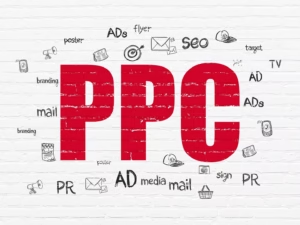In today’s digital landscape, you need a strong edge to outpace your competitors. One such edge comes in the form of PPC Reporting Software. Let’s be frank, managing a PPC campaign isn’t a cakewalk. With an ever-growing list of metrics to track and optimize, it can get overwhelming. What if there was a way to simplify it all?
Automated PPC Reporting Software is the solution to all time-consuming and complex problems. The PPC marketing reporting tool is like your personal assistant, dedicated to streamlining your PPC campaigns. It collects marketing data from various data sources, makes sense of it, and provides you with insights that can make or break your campaign’s success.
No more late-night number crunching or spreadsheet juggling. No more wondering if you’re throwing your budget into a bottomless pit. Data Bid Machine’s PPC Reporting Software is here to take the reins, giving you the freedom to focus on strategic decision-making.
But what does this software really offer to marketers and marketing agencies? And how can it revolutionize your PPC game? It gives you features such as custom report templates and widgets and empowers you to synthesize cross-channel marketing data, providing a unified view of your campaign’s performance.
Stick with us as we delve into the nitty-gritty, dissecting how PPC reporting software can be a real game-changer for your digital marketing efforts.
What is Pay-Per-Click or PPC?
Pay-Per-Click, commonly referred to as PPC, is a cornerstone of modern digital marketing.
PPC is a form of online advertising where you, as an advertiser, pay a fee each time someone clicks on your ads. Sounds simple, right? But the real beauty of PPC, which is often leveraged by adept PPC marketers, lies not in its simplicity, but in its potential for targeted reach.
Consider this: you’ve got a product or service ready to market. Your website, optimized with SEO, is sleek and user-friendly, and your branding is spot on, but you’re missing one thing – visibility. This is where PPC steps in, using different PPC channels to maximize your reach.
When done right, PPC allows you to propel your business in front of the right audience, at the right time. This gives businesses the unique ability to drive immediate results and deliver interested customers directly to your landing page, tracked efficiently using tools like Google Analytics.
Furthermore, PPC campaigns can be tailored to match your specific business goals, be it brand exposure, lead generation, or e-commerce sales. With the right mix of keywords and engaging ad copies, PPC can turn your business objectives into tangible results.
But how do we ensure our PPC campaigns are truly effective? How do we translate clicks into conversions and make the most of our advertising budget? The answer lies in tools that help with marketing analysis, like PPC reporting software. It provides us with data-driven insights to optimize our PPC strategies, making it a vital cog in the digital marketing machine.
What is a PPC Report?
A PPC report is a collection of data from your Pay-Per-Click campaigns. But it’s not just a raw dump of numbers and statistics. It’s a meticulously crafted document that provides a snapshot of your campaign’s performance, highlights its strengths, pinpoints weaknesses, and sheds light on areas of opportunity.
Now, let’s talk about its implications.
A PPC report is a roadmap that guides your future marketing decisions. By analyzing your PPC report from scratch, you can understand which elements of your campaign are drawing in customers and which ones aren’t hitting the mark.
This knowledge is a powerful tool for marketing, enabling you to refine your strategy, improve your ad spend efficiency, and ultimately, boost your return on investment.
So the question is, what does a PPC report include? What are the data points or metrics it provides?
While the specifics can vary based on your campaign objectives and the PPC reporting software you use to help you manage PPC, there are a few key metrics that most PPC reports include. These are:
- Click-Through Rate (CTR): This tells you how many people clicked on your ad after seeing it. A higher CTR often indicates that your ad is resonating well with your target audience.
- Cost Per Click (CPC): This is the average amount you pay each time someone clicks on your ad. Keeping an eye on your CPC can help you manage your budget effectively.
- Quality Score: This is a measure of the relevance and quality of your ad. A high-Quality Score can lead to lower costs and better ad positions.
- Conversion Rate: This shows the percentage of clicks that resulted in a desired action, such as a purchase, sign-up, or download. It’s a clear indicator of the effectiveness of your ad in driving desired outcomes.
- Return on Ad Spend (ROAS): This measures the revenue generated for every dollar spent on advertising. It’s a critical metric for assessing the profitability of your campaign.
What Must Be Included in The PPC Report?
To fully leverage the potential of PPC reporting software, it’s crucial to zero in on key metrics that define the success of digital advertising.
When presenting a PPC report to a client, you’re not just sharing data, you’re telling a story – the story of their campaign’s performance. The goal of client reporting is to make this story as clear, comprehensive, and insightful as possible. Here’s what should be included to ensure that:
Executive Summary
Start with a snapshot that encapsulates the key achievements and observations of the campaign. This summary should give your client a quick overview of the campaign’s performance and draw attention to significant wins or areas that need improvement.
Campaign Objectives and KPIs
Clearly outline the agreed-upon objectives of the campaign and the Key Performance Indicators (KPIs) used to measure success. This sets a clear context for the data that follows and aligns with expectations.
Detailed Performance Metrics
Dive into the specific metrics of the campaign. This may include:
- Clicks and Impressions: The number of times the ad was clicked and seen.
- Click-Through Rate (CTR): The ratio of users who click on the ad to the number of total users who viewed the ad.
- Cost-Per-Click (CPC): The average amount paid for each click on the ad.
- Conversion Rate: The percentage of users who took a desired action after clicking on the ad.
- Return on Ad Spend (ROAS): The revenue generated for each dollar spent on the campaign.
Keyword Performance
Show how different keywords are performing. Highlight those driving the most traffic and conversions, and discuss plans for underperforming keywords.
Ad Group Performance
Break down performance by ad group. This allows clients to see which specific aspects of their campaign are most effective and which ones need tweaking.
Trend Analysis
Include a comparison of the current PPC performance report with past data. This trend analysis helps identify patterns, seasonality, and long-term growth or challenges.
Insights and Recommendations
This is a crucial part of the report. Here you share your expertise by interpreting the data and providing actionable insights. Suggest changes based on the data, propose new tests, or recommend shifts in strategy.
Visuals
A picture is worth a thousand words. Use charts, graphs, and tables to visually represent data, making it easier for clients to understand and absorb.
Conclusion
Wrap up the report with a brief summary of the campaign’s overall performance, reiterate the key takeaways, and mention the next steps.
Creating a PPC report is all about transparency, clarity, and actionable insights. Include these elements to ensure your clients fully grasp their campaign’s performance and the value you bring to their digital marketing efforts.
What is PPC Reporting Software? Automate PPC Reporting in Digital Marketing
PPC reporting software is a specialized tool designed to help digital marketers manage and analyze their PPC campaigns. PPC reporting tool for digital marketing not only collects and consolidates PPC data from your custom PPC ad campaigns but also presents it in a way that’s digestible and easy to understand.
This software is designed to collect and analyze campaign data across various marketing channels like Google Ads, Facebook Ads, Bing Ads, and more.
Let’s face it, numbers and raw data can be intimidating. But when you have a PPC reporting tool for agencies that translates these numbers into meaningful insights, you have the power to make informed decisions. That’s what PPC reporting software does. It takes complex data sets and marketing analytics and simplifies them, so you can see what’s working and what’s not in your campaign.
And it’s not just about simplification. A good PPC reporting software is like having a magnifying glass that brings critical details into focus. Wondering why your click-through rate dipped last week? Or why a certain ad group is outperforming others? Your PPC reporting tool can give you the answers.
But how does PPC reporting software enhance and streamline your digital marketing strategies?
It’s all about the insights.
Digital marketing, and PPC in particular, is all about refining and optimizing. It’s a constant cycle of testing, learning, and adjusting. With the detailed analysis provided by PPC reporting software, marketers can precisely pinpoint what’s driving results and what’s holding them back.
Imagine knowing exactly which keywords are yielding the highest return on investment, or which ad copy resonates best with your audience. These insights allow you to fine-tune your campaigns, allocate your budget more efficiently, and maximize your ROI.
What Features a Best PPC Reporting Tool Must Have?
Choosing PPC reporting software is a significant decision. The right tool can supercharge your marketing efforts and guide your campaigns toward success. But what should you be looking for in PPC reporting software?
Campaign Management
The software should offer comprehensive campaign management features. This includes the ability to monitor campaigns across different platforms (like Google Ads, Bing Ads, Facebook Ads), analyze performance, make adjustments, and even create new campaigns directly within the software. It should act as a central hub for all your PPC activity.
Ad Grouping and Ad Copy Analysis
The ability to organize and analyze your ads is crucial. Your chosen software should let you group ads based on criteria like keywords, products, or target audience. It should also offer ad copy analysis, helping you identify what resonates with your audience and drives results.
Keyword Tracking and Analysis
Keywords are the lifeblood of PPC. Good PPC reporting software will not only track your keyword performance but also provide in-depth analysis. This can help you understand which keywords are driving traffic, which are leading to conversions, and which may need to be reconsidered.
Conversion Tracking
Conversions are the endgame in PPC campaigns. Therefore, your software must effectively track conversions, whether that’s a sale, a sign-up, or a download. This will give you a clear picture of what’s working in your campaign and what needs improvement.
ROI Analysis
At the end of the day, it’s about return on investment. The software should provide detailed ROI analysis, helping you understand if your ad spend is translating into profits. It should be able to calculate metrics like Cost per Acquisition (CPA) and Return on Ad Spend (ROAS) to provide clear insights into your campaign’s profitability.
Integrations with Other Platforms
Your PPC reporting software doesn’t exist in isolation. It needs to play nice with other platforms like your CRM, email marketing software, or web analytics tool. Seamless integration allows for better data flow, making it easier to monitor and optimize your entire marketing strategy.
Benefits of Using PPC Reporting Software or PPC Reporting Tool
If you’re navigating the fast-paced world of digital marketing, you’ve likely realized the power of Pay-Per-Click (PPC) advertising. But how do you efficiently manage your campaigns and make the most of your ad spend? Here’s how it can bring a world of difference to your marketing strategy:
1. Time Efficiency and Automation
Time is a precious commodity in marketing. PPC reporting software takes the grunt work out of data collection and analysis. No more manual data mining or spreadsheet juggling. The software automates the reporting process, freeing up your time to focus on strategy and creative initiatives.
2. Data Accuracy and Consistency
Numbers don’t lie, but they can mislead if interpreted inconsistently or inaccurately. PPC reporting software provides accurate, up-to-date data, eliminating human error. This consistency in data analysis ensures that you’re making decisions based on the true picture of your campaign performance.
3. Holistic View of Campaign Performance
PPC reporting software doesn’t just provide numbers; it gives a holistic view of your campaign. From keyword performance to ad group analysis, from impressions to conversion rates, it offers a comprehensive understanding of all aspects of your campaign. This 360-degree view helps you identify what’s working and what’s not, informing your strategy in a way that few other tools can.
4. Data-driven Decision Making
Marketing should never be a guessing game. With the detailed analysis offered by PPC reporting software, your decisions become data-driven. Know exactly which keywords are pulling their weight, which ad copies resonate with your audience, and where your budget is best allocated. This empowers you to refine your strategies based on solid insights, not hunches.
5. Improved ROI and Conversion Rates
All these benefits boil down to one crucial outcome: improved Return on Investment (ROI) and higher conversion rates. By automating tasks, ensuring data accuracy, providing a comprehensive view of your campaign, and facilitating data-driven decisions, PPC reporting software enables you to optimize your ad spend. You can allocate your budget more effectively, improve your ad quality, and ultimately, drive more conversions.
PPC reporting software isn’t just a ‘nice-to-have’; it’s a ‘must-have’ for any business looking to maximize its digital marketing efforts. The benefits are clear: it saves time, ensures accuracy, offers a holistic view, supports informed decisions, and boosts your bottom line.
Best PPC Reporting Software for Agencies and Digital Marketers
PPC advertising has become a cornerstone of today’s digital marketing approaches for numerous businesses. To keep pace with your rivals, you need a tool like Data Bid Machine PPC Software that provides automated PPC reporting capabilities.
Data Bid Machine PPC Reporting Software covers everything from the optimized dashboard and metrics overview to ad performance analysis to evaluations of negative keywords and reports on your PPC campaigns. You can tailor and automate our software to fulfill any PPC advertising and data needs for your business and your clients.
Eager to kick off with Data Bid Machine advertising software? Begin preparing your PPC reports right here.




